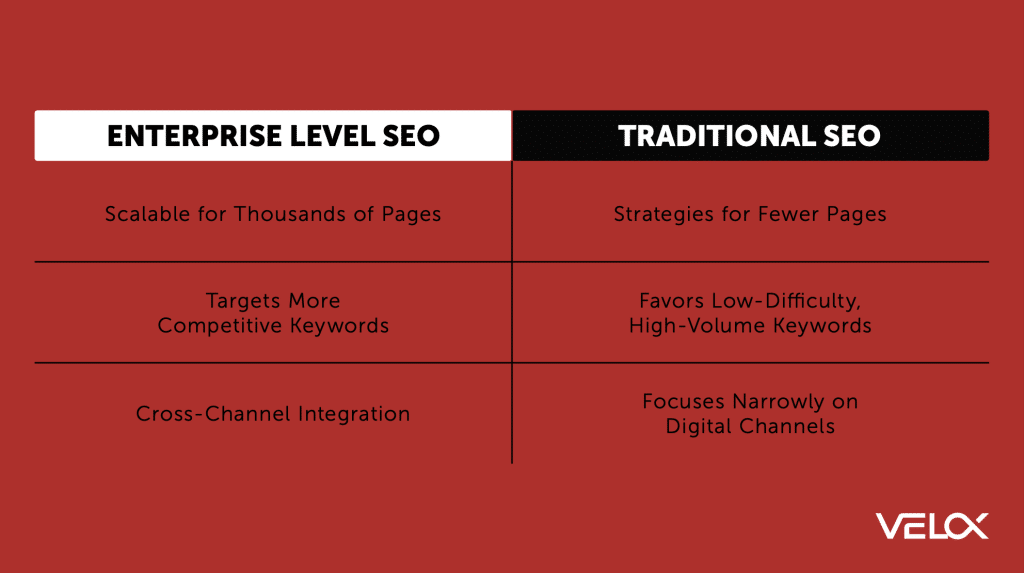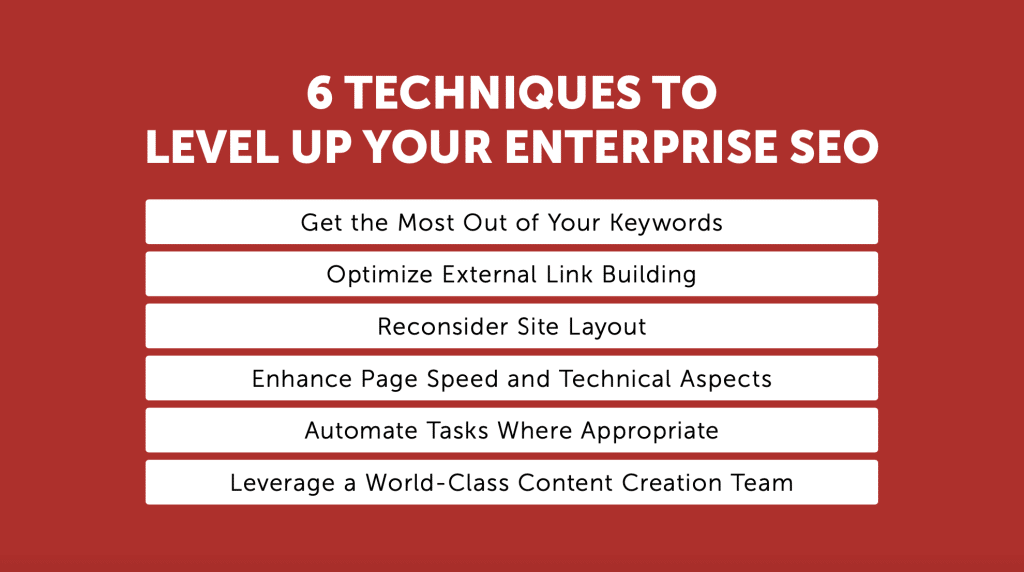
September 14, 2023
Tailored Enterprise SEO & Digital Marketing: Going Beyond Best Practices
There’s no one-size-fits-all approach to SEO. This is especially true for enterprise organizations motivated to maximize ROI and realize exponential growth—two goals that require far more than a cookie-cutter approach.
Enterprise SEO is a unique animal, and if you’re approaching it by simply leaning on the same SEO techniques used by SMBs and startups, you’ll likely fall short of the results your business needs to succeed.
Whether you’re looking to maintain your edge in a hyper-competitive vertical or your company is entering a new phase of growth, it’s vital that you get your enterprise SEO strategy right. To help you avoid roadblocks and detours, this article will provide the details you need to get started.
Let’s dive right in by discussing the unique characteristics of enterprise SEO.
What Is Enterprise SEO and What Makes It Different?

A lot changes as a business scales, and SEO is no exception.
The reason is simple: While the goal of better search visibility, rankings, and traffic remains the same regardless of site size, how you achieve it is drastically different when your site has thousands of pages.
As if traditional SEO wasn’t challenging enough, enterprise SEO must factor in a multitude of brands, locations, and offerings to be effective, making the process far more time-consuming and complex.
Part of that additional complexity stems from the desire of enterprises to compete globally. Landing revenue-driving pages among the top local results may be a solid driver of growth for mom-and-pop stores or even regional chains, but beating out brands from all over the world for valuable real estate on SERPs is a different ballgame.
Another crucial distinction is the manner in which we target keywords in enterprise SEO.
Whereas budget-constrained SMBs may target keywords with an ideal balance of low competition but meaningful search volume, enterprises are far more likely to pay the high price necessary to rank for premium keywords.
Make no mistake—this can be an arduous process, particularly for firms that build their own in-house SEO teams and establish their expertise from the ground up. But when you have a healthy marketing budget and manage your spend wisely, the reward typically outweighs the cost for enterprise companies prioritizing digital channels as a driver of overall success.
Enterprise SEO also requires more comprehensive data analysis than traditional SEO.
Because these larger businesses are broader in scope and pursue overarching goals as opposed to short-term boosts in traffic, the process of monitoring metrics and tracking progress is much more involved.
One of the most difficult things to measure—yet also the most important indicator of success for many businesses—is the ROI of SEO.
But because tracking revenue growth is critical in evaluating ROAS and charting a business’ trajectory, savvy enterprise marketing leaders seek out an ROI-focused digital marketing agency that can deliver exponential results over the long term.
Although a focus on revenue is essential, it’s not the only reason businesses may turn to enterprise SEO agencies.
An experienced, trusted enterprise SEO company will also have an expert knowledge base, conduct leading-edge research, and use the latest technology to implement proven techniques for results that you just can’t achieve using free online SEO tools.
And finally, enterprise SEO must be integrated seamlessly with your other marketing channels to ensure cohesive branding and messaging.
Why Typical SEO Best Practices Fall Short in Enterprise SEO
If you’re not an SEO expert, it certainly pays to do your research before deciding how you’ll approach enterprise SEO strategies. While the implementation will be vastly different than most of what you read, it’s still vital to understand basic SEO concepts.
But as you come across articles discussing “the basics” of SEO or “SEO for beginners,” you’ll quickly see why virtually none of the boilerplate SEO guidance works when performing SEO for enterprise businesses.
The reason typical SEO best practices fall short in the enterprise realm largely boils down to the issue of scale. To put it plainly, enterprise businesses are far larger than your average SMB, and as such, they need to do more in order to realize the benefits of SEO.
With this in mind, it should come as no surprise that the SEO tools used by enterprise businesses and those used by SMBs are quite different.
Moz is one of the most well-known providers of SEO services, and they offer several subscription options, so let’s look at these for examples.
When you compare the standard plan from Moz to the premium plan, you’ll see that there’s a 15x difference in the number of trackable keyword rankings, as well as a 20x difference in the number of pages crawled on a weekly basis to identify technical issues.
When it comes to research, Moz’s premium plan includes up to 30,000 keyword queries and 100,000 backlink queries monthly. The standard plan, however, reduces those numbers to 150 and 5,000, respectively.
It’s clear that while a standard plan might work for an SMB, it wouldn’t have nearly enough horsepower for a growth-oriented enterprise business.
How to Level Up SEO for Enterprise Businesses
Now that the shortcomings of traditional SEO in an enterprise context are clear, let’s cover the fundamental elements of an enterprise-worthy SEO strategy.
Get the Most Out of Your Keywords
Many people, even some SEO professionals, think of keywords narrowly as a direct means of helping their priority web pages rank in SERPs. While this is true, it’s a surface-level understanding of keywords, and leaves a lot of marketing power on the table—especially for enterprises.
It’s not enough to drive users to a product page and call it a day. Particularly in competitive, global industries, you should be conducting and applying robust keyword research at every stage of the customer journey—which, by the way, is often nonlinear in today’s digital landscape.
Mapping keywords to each phase of your conversion paths is an indispensable technique. As we discussed in the previous section, it’s not something that may prove worthwhile for a local fitness center, but it’s vital for enterprises competing on the global stage.
But more than enhancing the funnel to boost conversions, growth-minded digital marketers want to help their enterprise scale. That’s why so many successful SEO campaigns use innovative tools to tie target keywords and landing pages directly to ROI.
Guesswork doesn’t cut it for enterprises, which is why the ability to forecast new revenue capture for any search term on Google has proven vital to businesses as they build and execute the digital marketing strategies that will help them scale.
Optimize External Link Building
On-page SEO alone isn’t enough to get your revenue-driving pages ranking for the keywords most valuable to your business, particularly in competitive industries.
When you need to elevate your brand above the competition, link building is a crucial piece of the puzzle. This involves building what’s known as “link equity” by getting other sites to link back to your pages.
There are a number of ways to go about this, but you may find it challenging to efficiently achieve the ideal results without stumbling across some of the common pitfalls.
For example, it’s imperative that you avoid bad links that Google recognizes as link spam. These include automated links, paid links, links from private blog networks—also known as PBNs—link exchanges, and more. You should also be sure to steer away from links embedded in widgets, excessive guest post links, and links from unrelated sites.
That said, there’s arguably no more worthwhile element of SEO than robust link building, so do your research and take all the time you need to get it right. Top-quality content that includes thoughtfully placed links can do wonders for your site as an off-page ranking factor, especially when that content is carefully syndicated.
Reconsider Enterprise Website Layout
Enterprises often use subdomains to better house and manage content because subdividing your site can help provide a better user experience.
You don’t need to bother with the hype about crawler confusion, either. Although some claim Google might incorrectly view your subdomain as entirely distinct from the main domain, you can rest assured that Google’s crawlers are sophisticated enough to recognize extensions of parent domains.
If your business puts a premium on UX for better engagement to improve SEO, your site layout is worth reconsidering.
Enhance Page Speed and Other Technical Aspects
Speaking of UX, there’s arguably no faster way to bounce a user than a deficient page-loading process, which is why page speed and SEO work hand in hand.
It’s important to regularly test your site speed with a trusted tool, such as Google PageSpeed Insights, and see if your pages measure up. If not, dive in and see where you can optimize.
From scaling back redirects and compressing images to caching or deindexing certain pages, page speed optimizations reliably pay dividends for enterprise businesses.
Automate Tasks Where Appropriate
As the digital marketing and SEO landscape has evolved, so too have the tools we use to make the most of it. As an enterprise, there’s immense value in centralizing and automating processes where possible, and SEO is no exception.
Whether you’re curious about ChatGPT for content generation or other AI-powered tools that can save your human bandwidth for more dynamic tasks, don’t miss the chance to learn about automation that can make for scalable workflows and streamlined project management.
Whether you’re using AI to create content summaries, optimize images, or enhance product descriptions, there are plenty of ways to incorporate AI in SEO as a means of realizing efficiencies and more acutely focusing your efforts.
But keep one thing in mind: Contrary to what some may think, AI can’t do everything. In fact, just this year, we saw Google Bard give a wrong answer in a widely publicized video clip, causing the company’s market value to drop.
Your enterprise can’t afford to make errors that hurt your online reputation, visibility, and site traffic, much less errors that make an immediate dent in your bottom line, so incorporate AI tools carefully.
Specifically, at this stage, it’s unwise to rely solely on generative AI tools such as ChatGPT for content creation. These tools are great for brainstorming ideas or even generating outlines, but at a minimum, an expert on your team should review and edit AI-generated content before publication.
Leverage a World-Class Content Creation Team
As an enterprise, you may find yourself positioned to realize greater ROI in certain areas than SMBs or startups. This is especially true when it comes to content creation, and in this vein, there’s no asset more valuable than an outstanding content creation team.
As you may know, Google places a premium on high-quality, helpful content with a high E-E-A-T score. Those are the pages Google wants to reward with high organic search rankings, and Google’s crawlers carefully evaluate content to identify the thin, impractical, or manipulative pages that belong at the bottom of search results.
Featuring engaging content and a flawless UX on your revenue-driving pages is a crucial step toward enterprise SEO success.
Whether you’re publishing compelling blog content to keep people coming back to your site, creating content for link building purposes, or both—and you really should be doing both—pieces written entirely by AI are unlikely to make an impact.
You don’t have to be a Google bot to recognize AI-generated content. There’s something about it that just seems a bit off, and if users don’t trust your content, they won’t keep reading or sharing.
That’s why content created by people, for people, will always perform best. It’s because people feel they can trust it—not just because Google says so.

Why Many Companies Partner with ROI-Focused Agencies for Enterprise Level SEO
We all enjoy creating something from the ground up, but that doesn’t mean building something on your own always makes good business sense.
When it comes to SEO for enterprise businesses, building your own in-house team may seem like a good idea. But from logistics to growing pains and overhead, it often proves to be a stumbling block that consumes resources and delays your efforts to scale.
Instead, many organizations turn to an ROI-focused agency for their enterprise SEO. With a trusted partner that provides a high-touch experience and shows you exactly how much new revenue your SEO campaign is contributing each month, you can stay on top of your growth and shorten your path to exponential results.
Achieve Exponential Growth with Enterprise SEO From VELOX Media
From technical optimizations to world-class content creation, informed keyword strategies, and much more, VELOX delivers the ROI-focused digital marketing solutions your enterprise business needs to scale.
Our SEO, marketing, and content specialists leverage their expertise to deliver stunning results. As a Google Premier Partner, VELOX is recognized among the top 3% of agencies globally because we consistently exceed client expectations. Using our game-changing New Revenue Model, our experts will forecast your campaign’s revenue capture and tailor a campaign to help your enterprise reach its goals.
Contact VELOX today and learn how we can help you achieve the exponential growth and sustained search engine dominance your enterprise needs to scale.